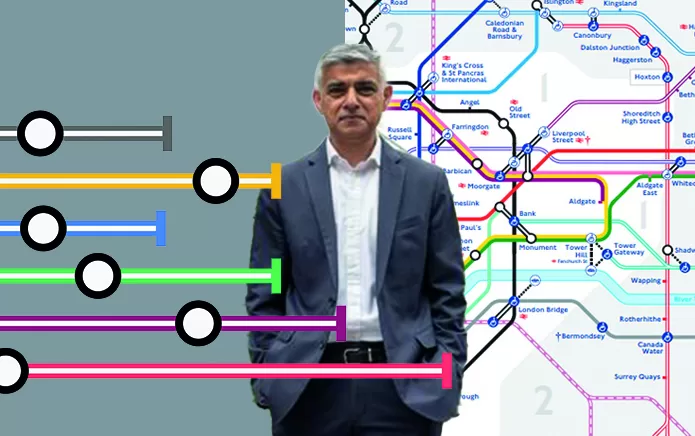The Mayor of London announced on 15 February that, for the first time ever, each of the capital’s six Overground lines will soon be represented by a new name and colour.
Each seeks to celebrate the city’s diverse culture and history, with the Mildmay honouring the Shoreditch-based hospital of the same name.
During the 1980s, it played a pivotal role in helping patients during the earliest stages of the HIV/AIDS epidemic, eventually helping to tackle stigma in society thanks to several high profile visits from Princess Diana.
Speaking to GAY TIMES on the day of the announcement, Khan said: “I’ve got friends who are from the LGBTQ+ community and some of the stories they tell me, it just breaks my heart.
“I lived through this, but obviously I wasn’t a recipient of the hatred, the animus, the prejudice, like they were. But, if we’re not careful, you can regress, and we’ve always been impatient with the lack of progress, but we’ve seen across the globe how sometimes you can regress, so we’ve got to tell these stories.
“We’ve got to make sure we educate people, we’ve got to make sure we understand our history, but also recognise those heroes, not just Lady Diana, but those who work in the Mildmay.
“Can you imagine the prejudice and stigma of those nurses and practitioners and clinicians who worked in Mildmay during the 1980s? We’ve got to salute them and recognise them.”
The rebranding of the Overground is set to take effect by the end of 2024
The names of all six lines were chosen after consultation with customers, stakeholders, historians, industry experts and local communities.
Mildmay, which will be represented by blue parallel lines on the map, will encompass trains running from Stratford to Richmond/Clapham Junction.
Meanwhile, the Lioness line that covers trains from Euston to Watford Junction and is represented by the colour yellow, honours the historic achievements of the England women’s football team.
READ MORE: “Inexplicable it’s taken until 2023”: Sadiq Khan on London’s first permanent HIV/AIDS memorial
The Windrush line, which will be red, serves journeys from Highbury & Islington to Clapham Junction/New Cross/Crystal Palace/West Croydon and runs through areas with strong ties to Caribbean communities today.
There will also be the maroon Weaver line from Liverpool Street to Cheshunt/Enfield Town/Chingford, which runs through areas of the capital known for their textile trade.
Running from Gospel Oak to Barking Riverside will be the green Suffragette line, which is named after the working class movement in the East End that paved the way for women’s rights.
Lastly, the Liberty line, which will be grey, honours the independence of the people of the borough of Havering and will cover trains travelling from Romford to Upminster.
Sadiq Khan recently called on the government to “fully commit” to ending new cases of HIV by 2030
The announcement about the Overground comes less than a week after Khan urged the government to increase funding for local authorities in order to end new cases of HIV in England by 2030.
In a letter sent to the Health Secretary on 8 February, he called for increased access to PrEP, more testing outside of A&E and more support for voluntary organisations.
I’m proud of London’s leadership on tackling HIV, but the Government’s failure to act threatens the progress made by our partners across the capital.
I’ve written to the Health Secretary urging her to take action to back up the Government’s promises in the fight to bring down… pic.twitter.com/vfKh2e7AvW
— Mayor of London, Sadiq Khan (@MayorofLondon) February 8, 2024
“There’s much more to do in relation to the government doing more; better education, more availability of PrEP, making sure that it’s easily accessible, removing stigma,” the Mayor told GAY TIMES.
“Another thing the government can do is be cognisant of their language, this really matters in terms of prejudice, stigma and hatred against this community.
“We can’t pretend things are perfect, I’m really proud to be Mayor of this great city, we’re the most progressive city in the world, but if there are challenges in London, imagine what it’s like in other parts of the country.”
